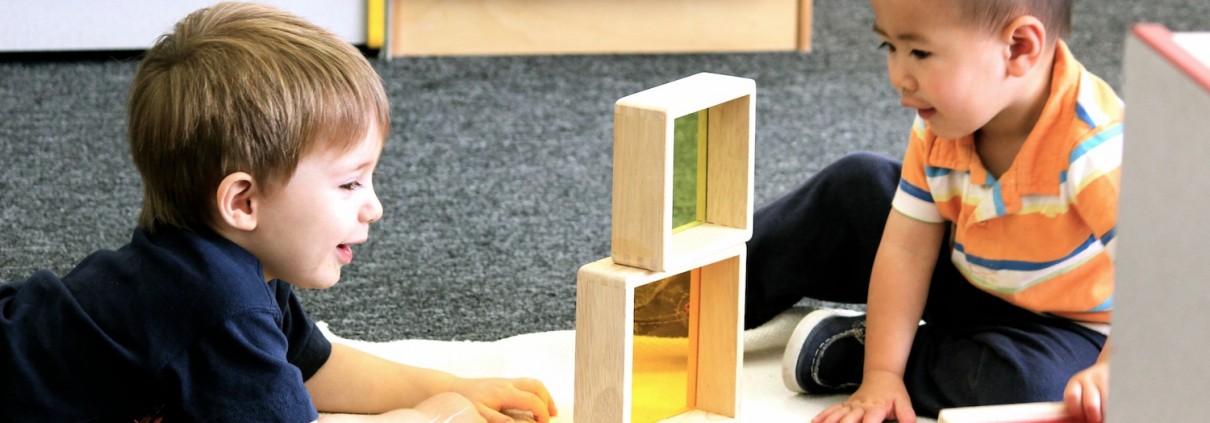To Share or Not to Share? (Part 1 of 3)
Part One of Three: Sharing vs. Surrendering: What Are We Teaching?
We’ve all been there: our two- or four-year-old is at a playground, happily scooping sand into a bucket, when another child approaches and takes one of the sand toys he has been using. Our child is upset. He cries, “I was using it! He took it from me!” and tries to take the toy back. In such a case, what we you do?
Conventional wisdom tells us we should encourage our child to “be the bigger person” and give the toy to the other child.

But what then do we do in the reverse situation, if our child is the one who grabs another child’s toy? In that case, what constitutes being “the bigger person?”
Many conscientious parents I speak with recognize the need to teach their children not to grab toys being used by other children. They explain to their child that there’s something improper about expecting another child to give up his toy—they highlight, for instance, that the toy belongs to the other child, or in the case of communal toys at a park, that “he had it first, so you have to wait until he’s done before you can play with it.” The underlying principle is that you can’t just take something that rightfully belongs to someone else.
 And yet, in the reverse situation, the same parents often don’t reinforce the “no taking” principle. Instead of protecting their child’s play, they encourage (and sometimes admonish) their child to give up the toy in question.
And yet, in the reverse situation, the same parents often don’t reinforce the “no taking” principle. Instead of protecting their child’s play, they encourage (and sometimes admonish) their child to give up the toy in question.
What underlies this difference between how parents approach other children and how they approach their own? Part of the issue may be that it can be hard to tell someone else’s child that they need to take a certain action. But I don’t think this practical challenge is all there is to it—I’ve seen the difference in many cases where it would be quite easy to gently encourage another child not to take a toy.
My impression is that the difference in approach often expresses a hidden belief that there is something noble in giving one’s possessions to someone else who wants it more—the “be the bigger person” sentiment I noted earlier. Parents don’t necessarily expect such nobility from other children, but they push their child to share because they believe they must hold their own child to a higher standard.
Is it really true that the noble, elevated response is to share—and if so, why, and in which context? In our culture today, the propriety of sharing on demand is taken for granted. Most parents I observe at playgrounds or at play dates expect their children to give up the toys they are playing with when another child becomes interested in them. This adult endorsement of sharing also is common in many daycare and preschool settings.
Sharing vs. Surrendering: Concepts and Moral Implications
Why is it important to teach our children to share? When I inquire, many conscientious parents I speak with cite two inter-related considerations. First is the fact that they want their children to grow up to be socially-adept, happy adults able to have healthy relationships. The willingness to share is, in effect, treated as an important marker of other good social skills, skills such as being able to sustain friendships, being kind, considerate and respectful, and generally having benevolent, positive interactions with others.
The second reason is the view that its important to teach their children to be altruistic—i.e. to be mindful of others who may have greater needs than they do, and to choose to subordinate their own needs to those others. If a child on a playground is having a temper tantrum, for instance, parents encourage their child to give up the toy because the other child is more upset and (by implication) want it more. In many cases, parents will force their child to give up the toy, but the general aim seems to be to develop in children the willingness to voluntarily embrace this practice.

While these two goals—to encourage benevolent, healthy social relationships, and to inculcate an altruistic impulse—seem superficially related, we don’t believe they really are. In our view, pushing sharing on demand may help achieve the second, but it actually undermines the first.
To understand why this is, it is helpful to clarify what we mean by “sharing,” as that term is often used as a “package-deal” that combines two very different ideas—voluntary sharing because one values another person and one’s relationship with them more than the possession one relinquishes, and surrendering under compulsion, because of either physical force or moral intimidation.
We take voluntary sharing to mean giving something one has to another person because one gains some benefit out of that immediate interaction (say, the ability to play with another child, rather than playing alone), or because one values the relationship with the other person (say, a friend or a spouse). Sharing, in that sense, is a trade of values, a win-win interaction: while the other person receives the physical good, the sharer receives an intangible benefit—a smile on the face of one’s spouse, a playmate to join in one’s games, the knowledge one has made friend’s day.
In contrast, in surrendering under compulsion, one sacrifices a value, either under the threat of physical force, or under the pressure to conform to societal norms or moral expectations, without getting a commensurate value in return.
Our children look up to us as their parents and teachers, and, generally, they want to please us. During the early years, we are their moral compass: they aspire to do as we do, to live up to our expectations. A strongly worded request by us that they share their toy or even a look or a sigh of disapproval if they don’t, can be very effective in getting them to comply to our wishes.
Rather than abusing that power to impel behavior, we should ask ourselves: in any given situation, are they sharing voluntarily, for the right reasons—or are they in fact surrendering under an implied compulsion, because the want to please us, because they don’t want to disappoint, because they dread our disapproval or other negative consequences imposed by us?
A young child who feels compelled by adults to surrender of his values, far from being empathetic to others, actually often comes to see others as a negative. Instead of viewing another child as a source of joy, a potential playmate or someone they can choose to collaborate with, they begin to view other children as threats, as intruders who may take their toys whenever they feel like it. To the child pressured to share, his toy is important: while it may not be his property in a legal sense, he certainly views it as his own while he plays with it.
If we make him surrender his toy mid-play, we unintentionally send the message that his needs don’t matter; that his play is unimportant; that anybody can take his things at will, and that adults morally expect him to surrender his things to anyone who demands them. He may react by being angry, maybe even becoming physically aggressive—or alternatively by learning to just give up and passively retreat whenever conflict arises. (This passivity is often mis-identified as being a “good little boy” or “good little girl”, but in fact it represents an arresting development of the child’s self.)
The damage is not limited to the child whose toy is taken. The child taking the toy, if that behavior is endorsed, also learns unintended lessons: she learns that it is ok to take things from others against their will, without asking for permission. She learns that she just needs to claim “he isn’t sharing”, and like magic, an adult will take her side and give her whatever she wants. She certainly doesn’t learn to respect the rights and personal space of the other child, to empathize with his feelings, or to control her impulses to grab things!
Our point here is not that sharing is bad, it is just that sharing isn’t an absolute, automatic good. We must assess sharing depending on the context and the underlying motivation—that is, must identify whether it is voluntary sharing for mutual benefit (whether physical or spiritual), or surrendering under compulsion. Here’s how one author puts the point:
The concept of sharing means choosing to let someone else use something you have or that is yours. It is a morally neutral concept… When it comes to values and moral values, the important factor in an act of sharing is with whom you share and why you share it. Should your daughter share her toys with her friends so they can play together? What about a bully at school to win his approval? I trust most parents who would rush to praise the sharing of toys between friends find it hard to tell their child, ‘You shared your homework with the class bully again! You’re such a good sharer!…’ Sharing is really about the personal connection and exchange of values (spiritual or otherwise) between two individuals. That is not something that can be forced or taught.
A child who knows his activities are cherished and protected by the adults around comes to view interactions with other children as an opportunity for voluntary cooperation and mutually enjoyable experiences—and as part of that, when he genuinely cares about another person, he naturally finds himself expressing that feeling in action (often including spontaneous sharing). In contrast, a child who is actively pressured to share comes to treat the resulting praise as an external reward that supplants his inner motives—a “moral sticker” of sorts, which he seeks to earn by doing something counter-intuitive to him in order to win the praise of adults. He comes to like the pat on the head, or to crave the sense of moral superiority, that being a sharer gives him. As a consequence, he may actually find it much harder to develop the voluntary impulse of goodwill that many parents love to see in their children.

Notice, when you think about it, that sharing on demand (“surrendering” in our terminology), the way it is typically encouraged in children, is in fact not at all well aligned with healthy, adult social interaction. When adults share, it’s usually with people (or causes) we value, and with objects we aren’t using right that moment. We may let a friend borrow a fancy dress, usually on a night we don’t need it. We may eagerly pass a book on to a friend to read, after we are done reading it. We may even share something in a situation where we do want or need it, generally because we care more about the person or cause we’re supporting than the possession we’re forgoing. We certainly would not just walk up to a stranger and grab the phone he is talking on; if we did, he’d probably call the police, rather than hand it over to us!
In summary, our view is that sharing is not in itself a virtue we should cultivate. Strong social skills are not something children learn by surrendering toys mid-play under direct or implied compulsion. Instead, we should extend to children the same respect for their belongings as we expect for our own. In so doing, far from making our children anti-social, we help them to view other children as potential playmates, as fellow human beings with something meaningful to offer, rather than unwanted sharers who may interrupt them at will and take their things, all with the adults’ blessing.
How does this approach work in practice, at school and at home? Click here to read Part 2, which discusses how to implement this approach at home, and Part 3, which describes how we handle sharing in the Montessori classroom.












